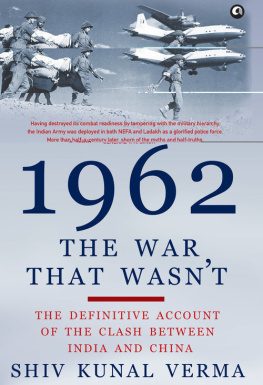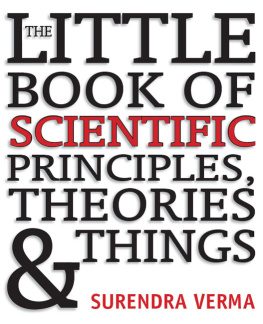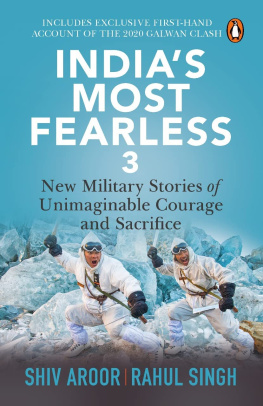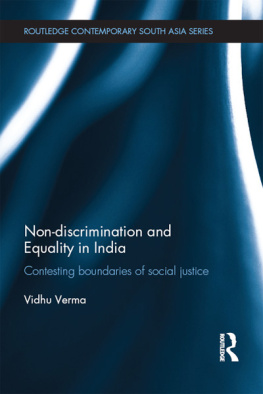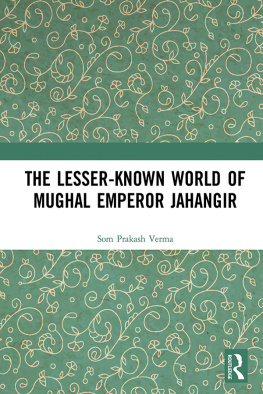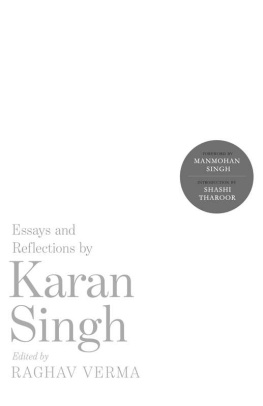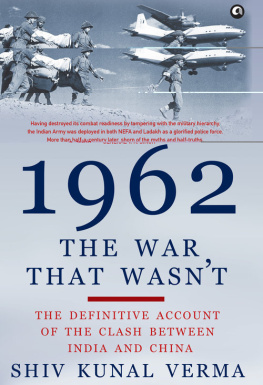1962
A story that needed to be told. Superbly writtenby far the most definitive book on the subject. Removes the fig leaves and sets the record straight, something that todays context will profit by emulating.
Dr Y. S. P. Thorat,
former Chairman NABARD and son of General S. P. P. Thorat
From the beginning to the end, the book literally grabs the reader by the throat. Brutally honest, every detail of the conflict with China is laid bare. Sooner or later Indians had to face the bitter reality of what actually happened in the high Himalayas. Perhaps now we can begin to bury the ghosts
Sam Rajappa,
former editor, The Statesman
More than half a century after the Sino-India clash in 1962, the truth emerges The author, steeped in military matters owing to his own background, is unfettered as he does not wear a rank on his shoulders. The end result is a masterpiece, vital for our understanding if we are not to make the same mistakes again.
M. G. Devasahayam,
former IAS officer
Riveting in both its style and substance, this is the story of an army that was let down by those in power and some senior officers, many of them virtual political appointees. Certain post-1962 reports may still be under the wraps for touching on certain subjects that this book fearlessly exposes.
Ashali Varma,
author of The Victoria Cross: A Love Story
and daughter of Lieutenant General Prem Bhagat, VC
Also by Shiv Kunal Verma
Ocean to Sky: India from the Air
Military World Games
The Northeast Palette
Assam Rifles: 1835 to 2010
The Long Road to Siachen: The Question Why
Northeast Trilogy (East of Kanchendzonga, Brahmas Creation and Children of the Dawn)
Courage & Conviction: An Autobiography: General V. K. Singh
ALEPH BOOK COMPANY
An independent publishing firm
promoted by Rupa Publications India
First published in India in 2016 by
Aleph Book Company
7/16 Ansari Road, Daryaganj
New Delhi 110 002
Copyright Shiv Kunal Verma 2016
All rights reserved.
The views and opinions expressed in this book are the authors own and the facts are as reported by him/her which have been verified to the extent possible, and the publishers are not in any way liable for the same.
While every effort has been made to trace copyright holders and obtain permission, this has not been possible in all cases; any omissions brought to our attention will be remedied in future editions.
No part of this publication may be reproduced, transmitted, or stored in a retrieval system, in any form or by any means, without permission in writing from Aleph Book Company.
eISBN: 978-93-84067-16-8
This book is sold subject to the condition that it shall not, by way of trade or otherwise, be lent, resold, hired out, or otherwise circulated without the publishers prior consent in any form of binding or cover other than that in which it is published.
for my father,
Major General Ashok Kalyan Verma,
and his generation that paid the price
We died, unsuccoured, helpless
We were your soldiers, men of bravery and pride
Yet we died like animals, trapped in a cage with no escape
Massacred at will, denied the dignity of battle
With the cold burning flame of anger and resolution
With the courage both of the living and the dead,
Avenge
Our unplayed lives
Redeem the unredeemable sacrifice
In freedom and integrity
Let this be your inheritance
And our unwritten epitaph
Harji Malik, Nam Ka Chu: October 1962
CONTENTS
MAPS
Introduction
LIVING IN THE SHADOW
After completing almost three years in the North East Frontier Agency (NEFA, now called Arunachal Pradesh), my father, Captain Ashok Kalyan Verma, was posted to the Indian Military Academy (IMA) in Dehradun as a platoon commander in July 1962. For him, this move would prove to be providential, for within a few months of his departure, 282 of the men and officers he left behind in 2 Rajput would be dead. The others were wounded or overpowered by the Chinese and taken prisoner. Among the handful who succeeded in getting away, some died of cold and starvation, while a few survived weeks of unbelievable hardship and made it back to the plains of Assam through the jungles of the Kameng Frontier Division and Bhutan.
We had moved into one of the spacious bungalows at the IMA sometime in September and I doubt if there could have been a more picturesque or happier place for a little boy to grow up in. Even though I was barely two years old, I have fleeting recollections of the place: Gentlemen Cadets, better known as GCs, running and cycling along the tree-lined avenues, horses being exercised on the polo ground, the commandants buggy with its coterie of resplendent sowars (mounted soldiers) and ponies, our own bungalow opposite the club and the one time a huge black rat snake suddenly appeared, scaring everyone. I remember the fallen leaves strewn on the ground, the imposing clumps of bamboo and the stunning majesty of Chetwode Hall that dominated the Academy.
Then, suddenly, as the colours of autumn gave way to winter, the Academy, like the leaves on the trees, seemed to shrivel into itself. Even to me, it was obvious that something terrible had happened.
Brigadier (later, Lieutenant General) Premindra Singh Bhagat was then the commandant of the Academy. An Engineer officer, he had been awarded the Victoria Cross in Ethiopia in 1941, making him the highest decorated officer in the Indian Army at the time of Independence. In his mid-forties, Bhagats receding hairline and bushy moustache gave him a dapper and somewhat avuncular appearance. As was the norm with all incoming officers posted to the IMA, he interviewed my father in early October. Glancing up from the dossier which contained Captain Ashok Kalyan Vermas service record, the commandant asked him if he was happy with his new posting. The usual answer that it was a great honour did not fool the brigadier, who could perhaps sense that the young officer in front of him was holding something back.
The commandant encouraged him to speak freely and the dam burst. My father said he had been posted out of 2 Rajput in July when it was de-inducting from the Lohit Valley where it had been deployed for the last three years. The battalion, under the command of Lieutenant Colonel Maha Singh Rikh, had been on its way to Mathura, but even as the men and equipment were being marshalled onto a special train at Missamari (near Tezpur), it had been ordered to redeploy in the Kameng Frontier Division as part of 7 Infantry Brigade. With barely any winter stores or equipment, the men had somehow made their way across Eaglenest to Bomdila, Dirang Dzong, Se-la and on to Tawang. They had then been pushed further north towards the Bhutan-NEFA-Tibet tri-junction. Military circles had been anticipating an armed clash with China, and under the circumstances the only place my father wanted to be was with the men of his battalion.
Brigadier Bhagat had been the Director, Military Intelligence at Army Headquarters, Delhi, prior to moving to the IMA. Obviously he had a reasonable idea of what was happening in NEFA and asked searching questions about the Kibithu and Walong sectors in the Lohit Frontier Division. Signalling the end of the interview, Bhagat said: I know how you feel, but you must now concentrate on training the GCs herethat has to have your entire focus. Let us hope the situation with the Chinese will soon sort itself out and hopefully all will be well.


